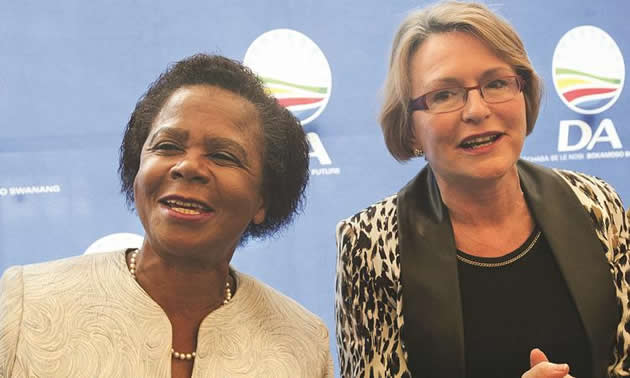
The Sunday Mail

 The Democratic Alliance is resorting to a number of gimmicks to look blacker. The disastrous attempt to appoint Ramaphele as its presidential candidate
The Democratic Alliance is resorting to a number of gimmicks to look blacker. The disastrous attempt to appoint Ramaphele as its presidential candidate
ended embarrassingly.
The white-led Democratic Alliance (DA), the official opposition, has been trying very hard to get blacker.
They have gradually incorporated blacks into their structures while maintaining the final say in their federal council.
The party, though, has found it hard to make any meaningful concessions to blacks in general, except attempts to win their votes through black faces.
A political commentator noted that, when there is a black caucus in the DA, then all is not well with respect to race.
The party ended up with egg on its face when an attempt to rope in Mamphela Ramphele as their neo-liberal candidate fell flat after a week, following an announcement on 28 January.
Helen Zille, the feisty DA leader, has admitted that many blacks will not vote for her because she is white.
The party has targeted 30% of votes in May, and is looking to upset things finally in 2019. But in the coming election, the DA calculates that the ANC will probably win 60% of the vote.
At the launch of its manifesto in Polokwane, where the historic toppling of ex-President Thabo Mbeki took place in 2007, the DA vowed to address jobs, education, and corruption, while warning that the progress made in the country under Mandela and Mbeki was currently being reversed.
The party has acknowledged the immense contribution made by the ANC in the fight against apartheid and that South Africa is a better place today.
It hailed both former presidents Mandela and Mbeki for their role in building the country, but said the ANC had changed under President Zuma. The DA claimed that South Africa’s “good story” preceded Zuma, who has let the country down through his incompetence and corruption.
“More and more, it seems that the best jobs and opportunities go to people with political connections. They are the insiders who benefit at the expense of the outsiders,” the party’s manifesto reads.
“Public money that should be used for services to the poor is being wasted on corrupt projects like President Zuma’s private house at Nkandla.”
The DA’s strategy, it seems, is to separate the current ANC from the past ANC, and consequently wean the black electorate from the liberation capital of the present.
In effect, you cut the umbilical cord and gobble up the separation. Praising Mbeki’s government in Polokwane (where Mbeki lost the presidency) is cynical since during his tenure Mbeki was not popular with the white-led DA, and often came under withering criticism for some of his pan-African pronouncements.
The DA promises to “break down the barriers between insiders and outsiders by cutting corruption and creating an enabling environment for job creation”.
It also promises a growth rate of 8% to help the economy create six million real jobs and halve unemployment over the next 10 years.
“We will break up inefficient state monopolies and distribute shares to ordinary citizens, to increase competition and bring down prices.
“We will invest at least 10% of the gross domestic product (GDP) in roads, ports, railways, airways, water and low-cost, high-speed communication infrastructure that the economy needs to grow.
“We will provide quality education by training 15 000 more teachers a year and ensure that every child has a textbook for every subject. We will (also) ensure that no student is denied further education because they cannot afford it. We will increase the National Student Financial Aid Scheme (NSFAS) budget to R16bn.”
To create jobs, the DA promises to make South Africa a “nation of entrepreneurs” by cutting red tape and “providing more support and training for small business”.
It also promises to “improve black economic empowerment” to ensure that it rewards companies which invest in their workers and create jobs.
It will also invest at least 10% of the country’s GDP in infrastructure development.
We will, we will, we will . . . The highly anticipated 2014 elections may seem like a three-horse race.
However, there are many other established parties in the mix, like the Inkatha Freedom Party (still led by the octogenarian Chief Mangosuthu Buthelezi), the Pan African Congress, the United Democratic Front, the African Christian Democratic Party, the Azanian People’s Organisation, and the Afrikaner Freedom Front Plus.
Then there are a few more newly registered parties apart from the EFF, Agang, and the National Freedom Party.
The central promises of all these parties are not dissimilar to the main contenders. All of them claim to be champions of the poor, and for good reason. But the power lies with the masses, come Election Day, to propel the myriad political organisations into a comfortable seat in parliament.
When the election is done and dusted, the parties mostly disappear until the next election, when they resurface with a recycled bag of promises for the poor.
The older, smaller parties, sensing that they may not be strong contenders, have been jostling to form alliances. — New African.



